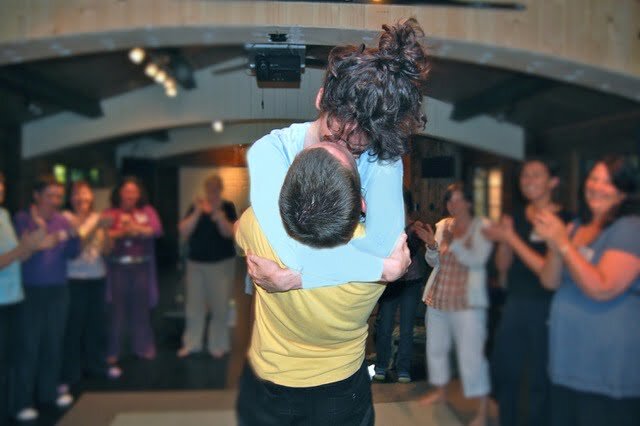What do you really want in your life? People will respond to this question in many different ways, but the most common answer is “I want to be happy.” The underlying premise that “happiness” is a worthy goal in life creates all kinds of psychological suffering. Do you actually know anyone who you would say is happy all the time, or even most of the time? Happiness is a transient emotion, one that is humanly unsustainable.
The premise that individual happiness is the ultimate goal of living gets us into all kinds of trouble, because it leads to an endless cycle of pursuit and disappointment. It starts in a moment of unhappiness. We ruminate about what it is going to take to fix this terrible feeling, and we identify some thing outside of self to pursue, in the misguided belief that if we get that thing we will be happy. A better job/body/outfit/car/house/life/partner. We live in an environment where we are bombarded by the message that we need something more, better, or different to be happy. We listen.
And yet, the promise never delivers. We might get the thing we think we need but end up disillusioned because it doesn’t bring happiness. At most, these achievements provide a moment of pleasure, which is nice, but when the pleasure fades, we decide we didn’t pick the right thing and embark on a new pursuit. Equally, we might suffer because we don’t get the thing we think we need.
We might be a little more enlightened about what we believe will bring us happiness and embark on a path of “self-improvement.” Now, there is nothing wrong with seeking to be a better person. However, self-improvement also has as its premise that satisfaction in life comes from actualizing our individual potential. Western culture in particular has been aggressively selling this for well over half a century now. The “American dream” is but one variation of the promise that happiness comes from pursuing and satisfying our individual ambitions in life. Ironically, as an adult population we are more depressed, overweight, addicted, medicated, and in debt than at any other time in history.
What we don’t realize is that in pursuing something more, better or different than what we are or have, we are saying that who we are, as we are, is not enough. The search is founded on the notion that something is missing. This is true if a person does not have enough to meet their basic food, shelter and clothing needs; but, research has consistently shown that once human beings reach slightly above subsistence level, meaning we have a little extra beyond meeting our basic needs, happiness levels across all income strata are not affected by having ‘more’.
There is a bigger, more worthy goal for us to aspire to as human beings, an experience that we all long for, and that is connection. There have literally been thousands of Attachment Theory–based books written about the human need for connection. Connection gives meaning and purpose to our lives. We all want to belong, to love and be loved. It is time to let go of our individualistic frame of reference and realize that the experience we long for is a collective one.
Despite the fact that technology apparently has us more connected than in any other time in history, we are suffering in isolation. We don’t know how to connect, and the ways we go about attempting to do so more often contribute to the problem. The lack of authentic connection permeates the very fabric of how we organize ourselves in the modern world. It explains and contributes more to our personal malaise, work issues, high divorce rates, mental illness, and physical sickness than any other factor.
Those on their deathbeds consistently report regretting the time they spent in pursuit of money or things. What is of most concern to them is love given and love received. Most evaluate their lives from the perspective of love, asking themselves, have I loved well? Do the people I love know that I love them? Have I had a positive impact? Will I be remembered well? When all the layers are peeled away, this is the desire we are left with at the core.
Just as fitness is a byproduct of exercise, happiness is a byproduct of loving, relational action. If we learn how to legitimately connect, we will find ourselves having many moments of happiness as a byproduct. The experience of connection transcends happiness, encompassing the whole spectrum of human experience. In connection we might feel pain, because pain is inevitable in our life experience, but pain felt when held, metaphorically or literally, in loving arms can be quite beautiful. We suffer in solitude, in the state of disconnection or isolation. Suffering, as Haruki Murakami said, is optional.
The problem is that we are strategic in our efforts to belong, because we get scared that if we reveal our real selves we will be rejected and hurt. The difficulties we experience in life, which are ultimately relationship difficulties, are because of what we hold in the basement of our psyches. If our psyche is metaphorically a house, the basement is the place where we hide our fears and vulnerabilities. We all have fears in the basement about not being good enough, being inadequate, unlovable, and so on, but we rarely reveal these fears. Instead, we hide, pretend, and defend, and that is ultimately what gets us into trouble.
To see what the basement looks like, and how to deal with it, read Part 2 of this post.

Catherine and Duane O’Kane are the founders of Clearmind international. It is Duane’s passion and belief that all that we strive for is held hostage in the middle of every moment, every relationship and every situation. Clearmind was birthed from these principles and continues to evolve. If you ask Catherine how Clearmind began, she says our mission statement “Love out Loud” sums it all up. Anyone can feel wonderfully inspired, but if it isn’t acted upon, it doesn’t have a life.

